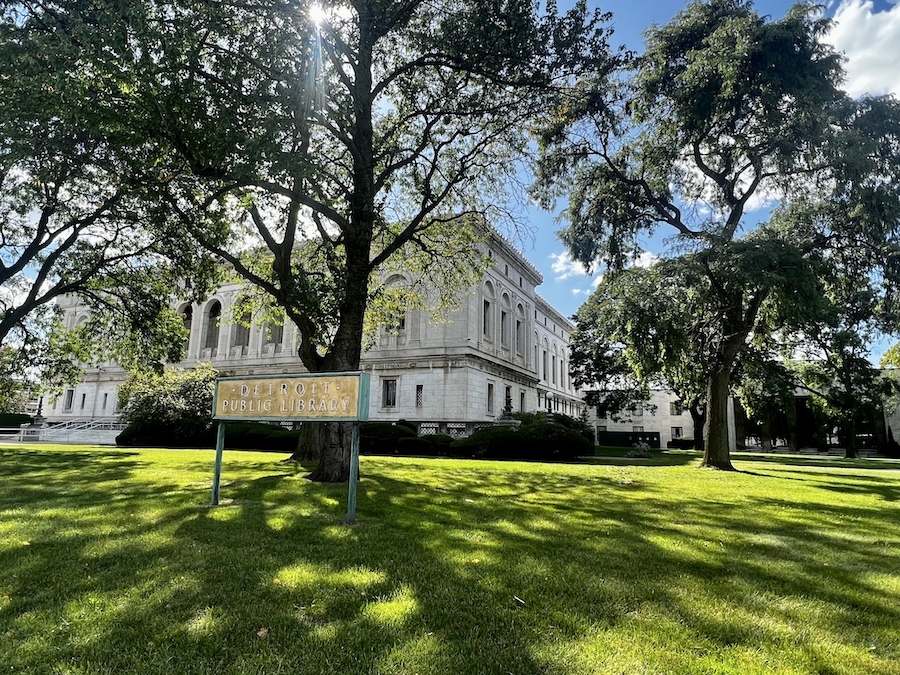
L’esprit de l’humanité, c’est l’esprit de l’industrie,i
Mais l’industrie a ses hauts et ses bas, alors nous nous redécouvrons les vérités anciennes,ii
Chaque quatrième tour des quatrièmes tours, à l’infini,
Comme une spirale ascendante, dans un metro tragitechnologocomique.
Nous essayons de contrôler nos environnements, comme des bouffons sans histoires.
Mais nous sommes des histoires, et des histoires sommes-nous, et les histoires continuent,iii
Même à Detroit, où nous nous promenons à travers des paysages de Berckheyde ou Saenredamiv
תָּפַסְתָּ מְרֻבֶּה, לֹא תָּפַסְתָּv
Alors nous faisons des efforts, chaque jour, mais ne prenons pas trop des fruitsvi
לֹא עָלֶיךָ הַמְּלָאכָה לִגְמֹר, וְלֹא אַתָּה בֶּן חוֹרִין לְהִיבָּטֵל מִמֶּנָּה
Ici, comme partout dans le monde, ce n’est pas notre obligation de finir le travail,
Mais nous ne sommes pas libres de nous en détourner non plus.
L’esprit de l’humanité, c’est l’esprit de l’industrie,vii
L’esprit de Detroit, c’est l’esprit éternel.
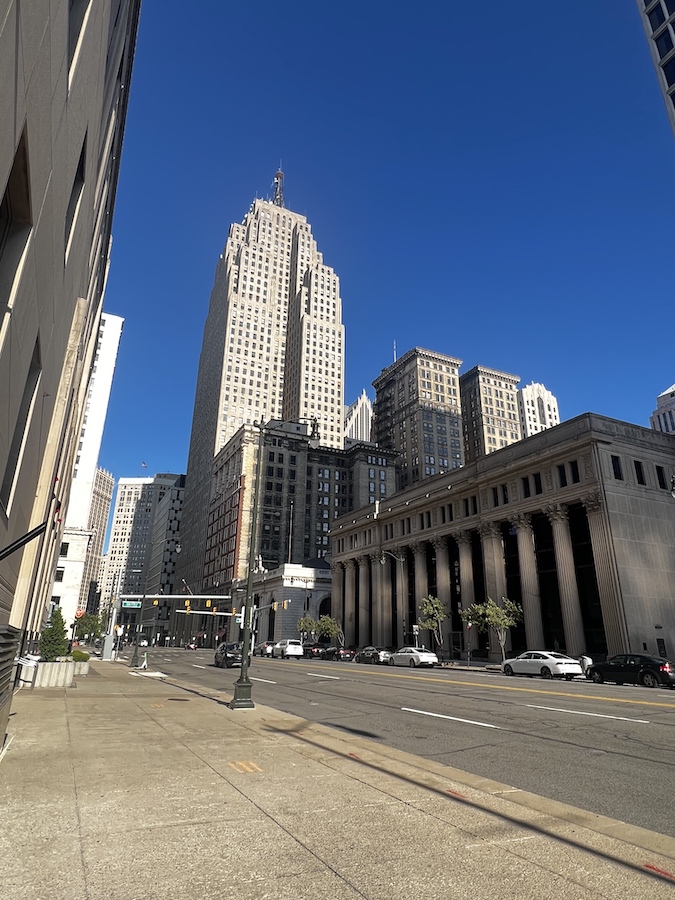
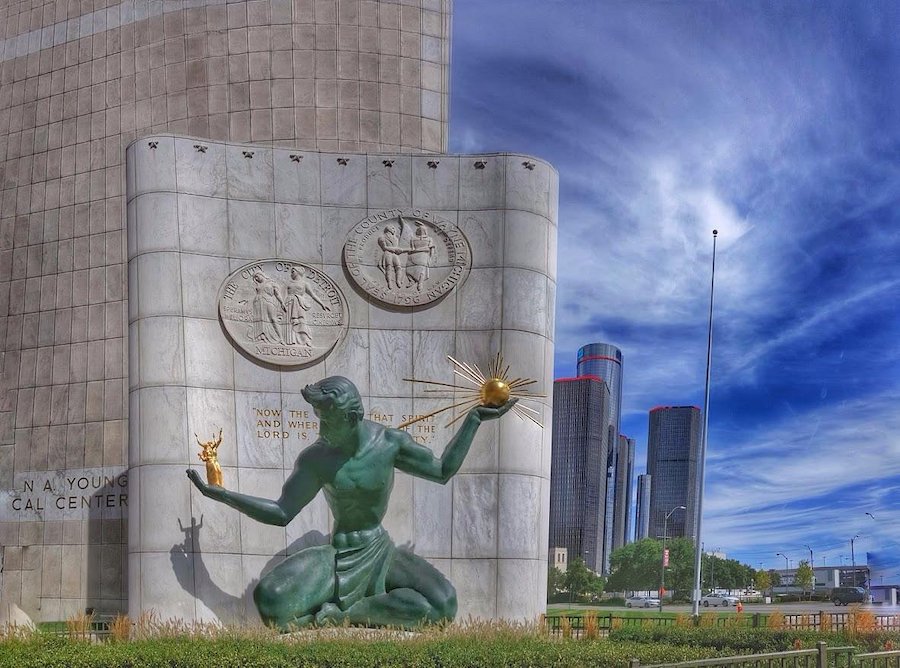
- “Post-industrial economy” my left foot! Yes, it’s easy and even profitable to off-shore single factories, but it’s inversely difficult and expensive to restart the entire industrial web of inter-woven connections hollowed out by these narrowly pseudo-optimised moves. So yes, “industry will be reshored to the Americas” and yes it’ll take at least the 50 years to regain that it took to dismantle. But it’ll all be worth it and a hell of a ride, full of opportunity for savvy entrepreneurs and investors! ↩
- At this point it seems kinda inevitable that our “modern” scientific age will become more and more kaballistic, even my man Dr. Iain McGilchrist is on the path!
↩ - Who could’ve predicted that “modern” “physics” was destined to become another genre of storytelling like all other philosophies since time immemorial? Go-go-gadget Assembly Theorists, that’s who! Be sure to give “Assembly Theory Explains and Quantifies the Emergence of Selection and Evolution” by Sharma, Czégel, Lachmann, Kempes,
Walker, and Cronin a quick read. It’s inevitable!Besides, isn’t all creation discovery? As His light recedes, we all come a little closer to Eternity. Again and again, spiralling upwards… ↩
- It’s hard to think of more grand and majestic buildings being depicted next to so few people, but that’s exactly how Detroit feels, like walking through the cityscape paintings of the Dutch Golden Age:
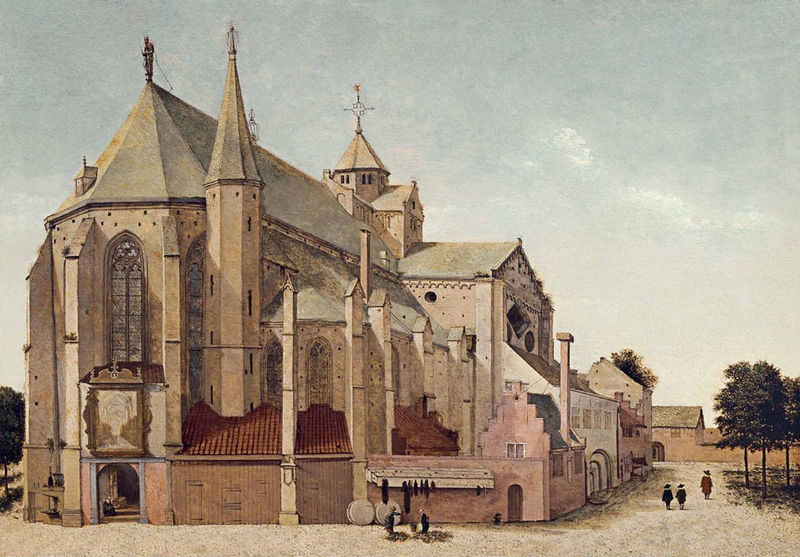
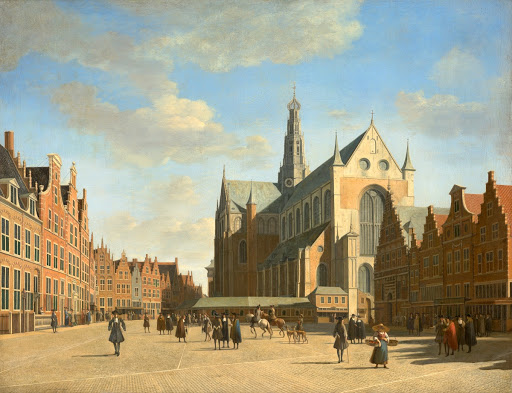
- “Tafasta meruba lo tafasta” is an Aramaic phrase originating (as far as we know) from the Talmud, and roughly translates to “If you grasp too much, you haven’t grasped anything” or “If you seize a lot, you haven’t seized anything.” ↩
- Remember our old friend Arjuna from the Bhagavad Gita? In Chapter 2, Verse 47, Lord Krishna tells him:
कर्मण्येवाधिकारस्ते मा फलेषु कदाचन।
मा कर्मफलहेतुर्भूर्मा ते संगोऽस्त्वकर्मणि।Karmanye vadhikaraste ma phaleshu kadachana,
ma karma-phala-hetur bhur ma te sango ‘stv akarmani.“You have the right to perform your prescribed duties, but you are not entitled to the fruits of your actions. Never consider yourself the cause of the results of your activities, and never be attached to not doing your duty.”
Sounds like a pretty good path to enlightenment, no? ↩
- Speaking of humanity and industry, just in case you thought that the arts and sciences were unrelated – or at least independent of one another (and that only money matters) – take the counter-example of Renaissance Florence, per Ada Palmer with TC:
PALMER: Italy was the economic center of medieval and Renaissance Europe. We talk about Big Tech, Big Pharma, and Big Oil, right? But in the Renaissance, it was Big Wool, Big Olive Oil, and Big Finance is an eternal thing. But Italy was the center for banking. It was the center for cloth production, which was the economic equivalent of the auto industry — giant industry. And it was also the center for the export of olive oil, which was not only a foodstuff at the time, but an industrial product necessary for a lot of production, and it was what you burned for light, a lot of the time, in oil lamps.
So, these tiny Italian city-states were richer than the large kingdoms outside of them but had smaller populations. They struggled to raise armies because they didn’t have enough people. They had to hire foreign armies to defend them, and yet they were full of the richest families on Earth, who literally had mountains of gold piled in their basements. If you’re a king and you want to conquer something, do you want to go for anything else or do you want to go for a small, friendless Italian city-state with piles of gold in the basement?
COWEN: But how does art protect them? How does that explain wonderful art in Florence?
PALMER: Imagine for a moment that you are the French ambassador, and you’re on your way to Rome to meet with the pope because the French king always needs this. Now, if you’re an ambassador, you’re, at minimum, the son of a count because only aristocracy can be ambassadors. On your way south, you’re stopping off in different cities, including Florence.
Now, you already have a terrible opinion of Florence because Florence is a pit of merchants, scum, and villainy. Florence, in order to prevent noblemen from taking over the republic, literally executed everyone in this city who had a drop of royal blood or noble blood. So, it’s just commoners. There’s not a single person in this city who is of sufficient right to be worthy to talk to you. In addition, Florence has such a terrible reputation for sodomy, homosexuality, and perversion that the verb to Florentine is literally the word for anal sex in five different European countries, including in France.
So, you’re on your way to this city, and it’s full of merchant scum and they’re all perverts and there isn’t even anyone there who’s worthy to host you on the way. You’re going to stay with your dad’s banker because he’s the only Florentine whose address you’ve got. You show up in the city, and you reach the city, and suddenly, wait a minute, it’s full of these gorgeous ancient Roman bronzes. Wait a minute, they can’t be ancient Roman bronzes. They look like they’re new, but that technology doesn’t exist. That technology was lost centuries ago.
Then you go to the banker’s house, and he greets you humbly at the door saying, “I’m sorry, my house is unworthy to host your excellency,” and he invites you inside, and you look around the courtyard, and it’s like nothing you’ve ever seen before, with these round circular arches that let enormous amounts of light shine in on the gardens and the statues. You’ve never seen this before. Wait, you have seen this before. It looks like the ruins of the Roman villa in the backyard of your father’s castle where you grew up, but that doesn’t exist anymore. Those arts were lost.
In the middle of the courtyard, there’s a gorgeous statue, an ancient Roman statue of Bacchus or Dionysius, and next to it, there’s a brand-new statue that’s obviously new because it hasn’t even turned green yet. The bronze is still ruddy. But that technology, you know, doesn’t exist.
In the corner, there are some men dressed in strange robes speaking a language you’ve never heard, and you say, “What language are they speaking?” The banker says, “Oh, they’re speaking Ancient Greek. They’re Plato scholars.” And you say, “But Ancient Greek is lost, and Plato is lost. How do you have this?” “Oh, we have lots of Ancient Greek here. Look, here’s my grandson, Lorenzo. He’s just written a sonnet in Ancient Greek about the three parts of the soul.” And then, here’s a little boy reciting a sonnet to you about the nature of the soul in Ancient Greek.
You’re like, “Where am I? All of this stuff is impossible.” And that’s the moment that your host, Cosimo de’ Medici, turns to you and says, “Would France like to make an alliance with Florence?”
You could say no, right? You could say, “No, we’re going to come here, we’re going to bring our army. We’re going to mop the floor with you because you’re helpless compared to our giant forces, and we’re going to burn this down and take the gold, and all of this will be gone, and we’ll be rich.”
Or you could say, “Yes. Let’s make an alliance. Send me a bronzesmith and an architect and a Greek tutor and a Plato scholar, and we’re going to bring them to the court in France, and the king is going to do his court like this. Then, when the envoys from England show up, they’re going to feel like uncultured country bumpkins, just like I feel now.” That’s how it’s a defense mechanism, because they are helpless on the military game, but they are so ahead on the culture game that you don’t want to hurt them. You want to befriend them so that you can have the art.

[…] you ask the Kabbalists or the Theoritical Physicists, they’ll tell you that it’s all connnected. So it is […]
[…] even in this tempest fierce, Where futures might unwind, There lies a hope, a thread so thin, That binds all of […]
[…] Humanity is never as liberal (or as sovereign)… […]
[…] Tragicomically, instead of leveraging our newfound leisure to create untold splendours and reach new heights of human civilisation – the kind that would make the fourth millenium‘s Napolean weep at our feet – we find ourselves merely capable of filling our evidently worthless days with mindless meetings and bureaucratic make-work projects, pretending to “work” “full-time” when in fact only putting in at most a day’s honest labour per week, with the rest spent busily doom-scrolling, “optimising,” or vapidly status-seeking atop the sinking titanic that is our late-stage industrial society. Turns out, the overwhelming majority of “people” don’t deserve leisure and the world would be a better place if they had 99% less of it! […]
[…] we can hope for in this Hesiodic Iron Ageiv / Dark Age / Hurricane : a very quiet selection for optimism and inter-generational thinking. At least for a few of […]